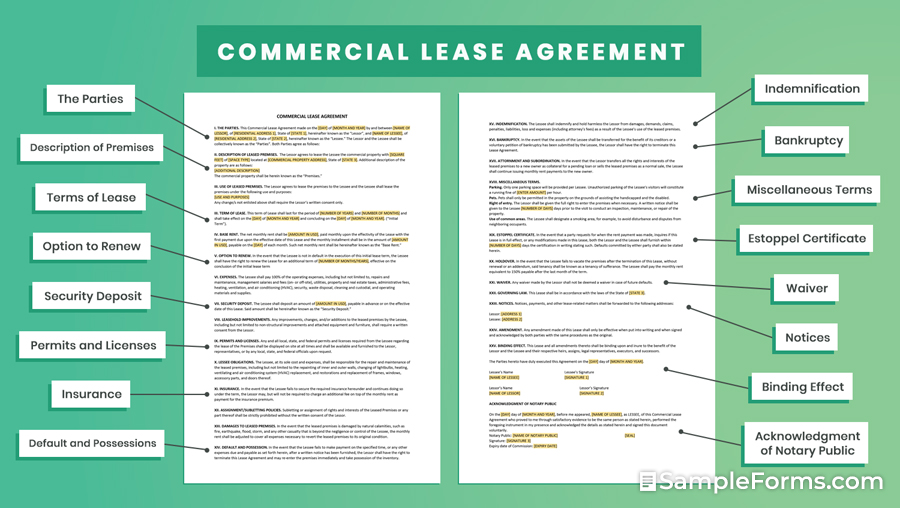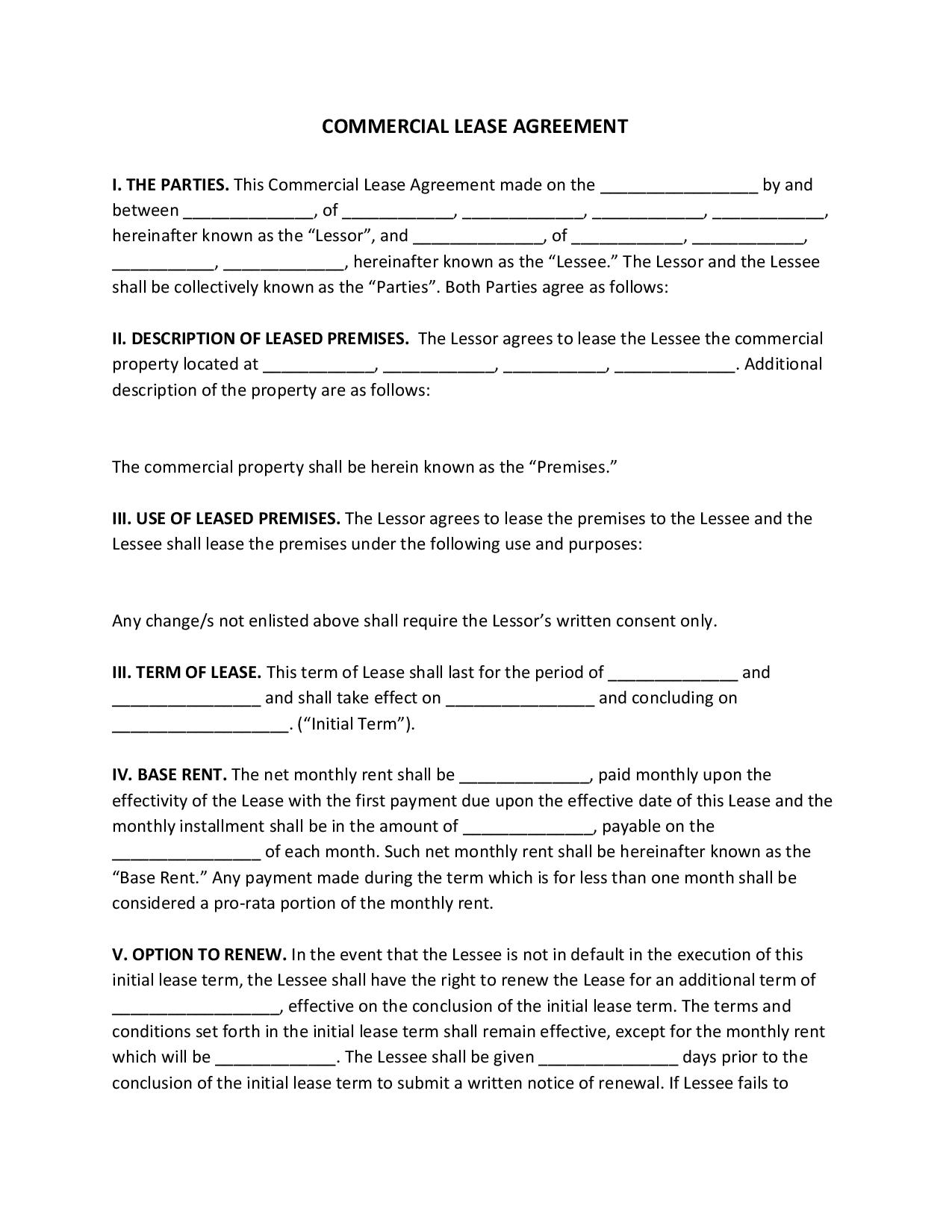- Eviction Notice Forms
- Power of Attorney Forms Forms
- Bill of Sale (Purchase Agreement) Forms
- Lease Agreement Forms
- Rental Application Forms
- Living Will Forms Forms
- Recommendation Letters Forms
- Resignation Letters Forms
- Release of Liability Agreement Forms
- Promissory Note Forms
- LLC Operating Agreement Forms
- Deed of Sale Forms
- Consent Form Forms
- Support Affidavit Forms
- Paternity Affidavit Forms
- Marital Affidavit Forms
- Financial Affidavit Forms
- Residential Affidavit Forms
- Affidavit of Identity Forms
- Affidavit of Title Forms
- Employment Affidavit Forms
- Affidavit of Loss Forms
- Gift Affidavit Forms
- Small Estate Affidavit Forms
- Service Affidavit Forms
- Heirship Affidavit Forms
- Survivorship Affidavit Forms
- Desistance Affidavit Forms
- Discrepancy Affidavit Forms
- Guardianship Affidavit Forms
- Undertaking Affidavit Forms
- General Affidavit Forms
- Affidavit of Death Forms
Commercial Lease Agreement
Business entities need commercial space to gather their patrons in one place of trade—it’s where they are legally allowed to transact business. To be able to stay in a commercial space legally, they must sign a commercial lease agreement with the lessor to operate. The agreement dictates how long they should stay on the premises and other stipulations required by the lessor. Read on below to gain a background about commercial lease agreements. Read More
Commercial Lease Agreement
What Is a Commercial Lease Agreement?

A commercial lease agreement is an agreement regarding the rental of an office, industrial, retail, or lodging and amusement space between a lessor and the lessee. The lessor agrees to rent the commercial space in exchange for payment. According to Statista, in the United States, about 89.52 billion US dollars worth of commercial real estate were built in 2018. This industry has been expanding slowly since the year 2010.
How to Create a Commercial Lease Agreement?
Unlike the residential property, the lessees in a commercial property are given the liberty to alter the interiors and exteriors of the building to fit their brand as long as they revert it to its original condition once their lease expires. The use of the commercial space shall be solely intended for what is stated in the lease.
Creating a commercial lease agreement is difficult to make without a guide. We have listed informative tips on how you can make your commercial lease agreement.
1. Use a Template
Want to get the job done quickly? Use a commercial lease agreement template! These templates have prewritten content that is ideal for the type of lease that you want. The template lets you fill out the form according to the state you belong to. Once done, the template can be downloaded.
2. Supply the Pertinent Initial Information
The initial part of the agreement starts with the identities of the lessor and the lessee, the lease term, the legal description of the lease, and the purposes of the lease. The purposes of the commercial lease must be indicated explicitly in the agreement because the lessee cannot use the property for other purposes not stated in the lease.
3. Set Out the Lease Term, Deposit, Payment Terms, and Relevant Stipulations
How long does the lessee plan to occupy the commercial space? And how much does the lessee have to pay for the deposit? The monthly rent? Indicate the starting and ending dates of the lease and the due date of the rent each month. You should also give the lessee an option to renew the lease and on what terms. Include other relevant stipulations in the agreement that you think is not included in the agreement.
4. Consult with Your Lawyer, Sign and Execute the Agreement
It is advisable that you consult with your lawyer first before signing the document. Afterward, you may sign the document with the other party in front of the notary public and execute the agreement. Include the names of the lessor and lessee along with the date of execution.
5. Include the Notary Public’s Acknowledgment
This legally binding agreement requires the notary public’s acknowledgment to ensure that the lessee is aware of the contents of the agreement and that they willingly signed the document. The notary public also verifies the identities of both parties. Important documents such as agreements, only have the full faith of institutions if they are notarized.
Frequently Asked Questions
How does a lessee end a commercial lease early?
The lessee may approach the lessor personally and request to surrender the lease. To surrender your lease means that the lessee and the lessor agree to end the lease. The lessee should negotiate the surrender soundly with the lessor.
How do I write a commercial lease agreement?
You have two options: Have the lawyer do it for you or you can do it yourself. If you prefer the latter, make sure to collect all relevant and essential information and include them in the agreement. Make it a habit to review an important document before signing it to make sure everything is correct and in place. Once done, sign the agreement in front of the notary public.
What makes a lease valid?
According to the Balance Small Business, the lease should have these four elements: legal purposes, consideration, the capacity to contract (both should be above 18 years old, of sound mind, and in no way coerced), and offer and acceptance. If any of these elements are absent, especially the capacity to contract, then the lease is considered invalid.
What is the usual duration of most commercial leases?
According to Austin Tenant Advisors, most commercial leases last up to 3-5 years, depending on the lessee’s credit, market conditions, the severity of the lessee’s improvements, and the current condition of your space.
What should I do if the commercial lessee does not pay rent?
There are many factors to consider as to why your commercial lessee has stopped paying rent. Do they have previous poor records in terms of paying? Are they nearing bankruptcy? And so on and so forth. But if the current market is competitive and the commercial lessee has a previous record of delinquency, you can resort to forfeiture. This is where the lessor re-enters the property to change the locks and terminates the lease immediately.
The lessor and the commercial lessee are both businesspersons in a way. But in a situation such as this, everything has to work in the favor of the lessor fairly. The commercial lessee needs an avenue that is accessible to their patrons—hence, the commercial renting. Furthermore, the lessor shall set ground rules in the form of an agreement to prevent chaos and to ensure order in the premises throughout the term.

